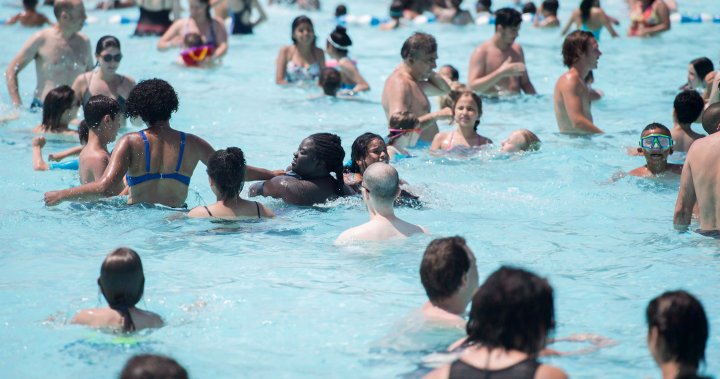Warm weather is finally settling in, which means more time by pools, lakes and rivers across Canada this summer.
Water safety experts urge you to exercise caution around all bodies of water, whether you’re quickly cooling off or heading out for some laps.
Adam Di Fulvio, president and CEO of the Montreal Institute of Swimming, said drownings begin to ramp up at this time of year.
“It’s important that people — before you get in your pools, before you go on your lakes, rivers, boats — take a moment, reflect, assess, know the risks,” he said in an interview Tuesday with Global News Morning.
“Make sure that you’re doing everything possible to be safe and encourage safety amongst others that are with you as well.”
The Canadian Drowning Prevention Coalition reports that more than 400 Canadians die from drowning annually. Not only is drowning preventable, but it’s also “a substantial cause of morbidity and mortality” in the country and it is the third leading cause of unintentional injury death worldwide.
To date, the Quebec chapter of the Lifesaving Society has recorded 19 unofficial drownings in 2023. It reported 61 unofficial drownings in the province last year, down from 81 in 2021.
Di Fulvio said that “over the past year we’re going in the right direction,” but that was the annual number of drownings was still “slightly up, if not right around, our historical trends.”
There is always work to be done to bolster water safety, he added.
“One drowning is definitely too many,” he said.
When it comes to prevention at home, Di Fulvio says that are tips for parents and children, as well as pool owners known as the ABCs.
“A is always watch your kids. No distractions, no doing other chores. Eyes on direct supervision,” he said. “B, be able to swim. Kids can start learning or take swimming classes as of six months. It’s never too young to learn. It’s never too late.
“And C is the checklist for backyard pool safety, which essentially means making your backyard pool an impenetrable fortress with a four-foot permanent fence (with a) self-closing, self-locking gate.”
That kind of gate prevents kids from getting in and out of the pool by themselves, he said.
Being safe in lakes, rivers
The Canadian Drowning Prevention Coalition reports that water-related deaths are most likely to occur on weekends from May to September in natural bodies of water, such as lakes and rivers. Fewer drowning fatalities occur in man-made settings, though bathtubs and private pools are among the most common.
Drowning in open bodies of water often comes down to a few factors, according to Di Fulvio.
“Being alone, not having a lifejacket, or weak or non-existing and nonexistent swimming skills contribute to the vast majority of open-water drownings that do occur,” he said.
Di Fulvio recommends nixing the solo trip and always swimming while accompanied by at least one other person. Anyone who does go into open bodies of water should also know how to swim, he added.
Lifejackets also go a long way in preventing drownings in rivers and lakes.
“I know it’s not always the glorious thing to do. It could be cumbersome, but it literally saves lives,” Di Fulvio said.
The Lifesaving Society recommends staying sober when it comes to water-related activities, since alcohol and cannabis affect balance, judgment and reflexes.
A 2017 report prepared for the organization by the Drowning Prevention Research Centre Canada says drinking was reported as a major risk factor in both boating and swimming-related drownings.
Drinking doesn’t discriminate when it comes to age, either.
The Canadian Drowning Prevention Coalition’s report prepared last year notes that from 2013 to 2017, alcohol was present in 44 per cent of fatal drownings among people aged 15 to 34. It was detected in 43 per cent of drowning deaths in the 35 to 64 years old category and in 18 per cent among Canadians who are 65 and older.
© 2023 Global News, a division of Corus Entertainment Inc.
Stay connected with us on social media platform for instant update click here to join our Twitter, & Facebook
We are now on Telegram. Click here to join our channel (@TechiUpdate) and stay updated with the latest Technology headlines.
For all the latest Health & Fitness News Click Here

